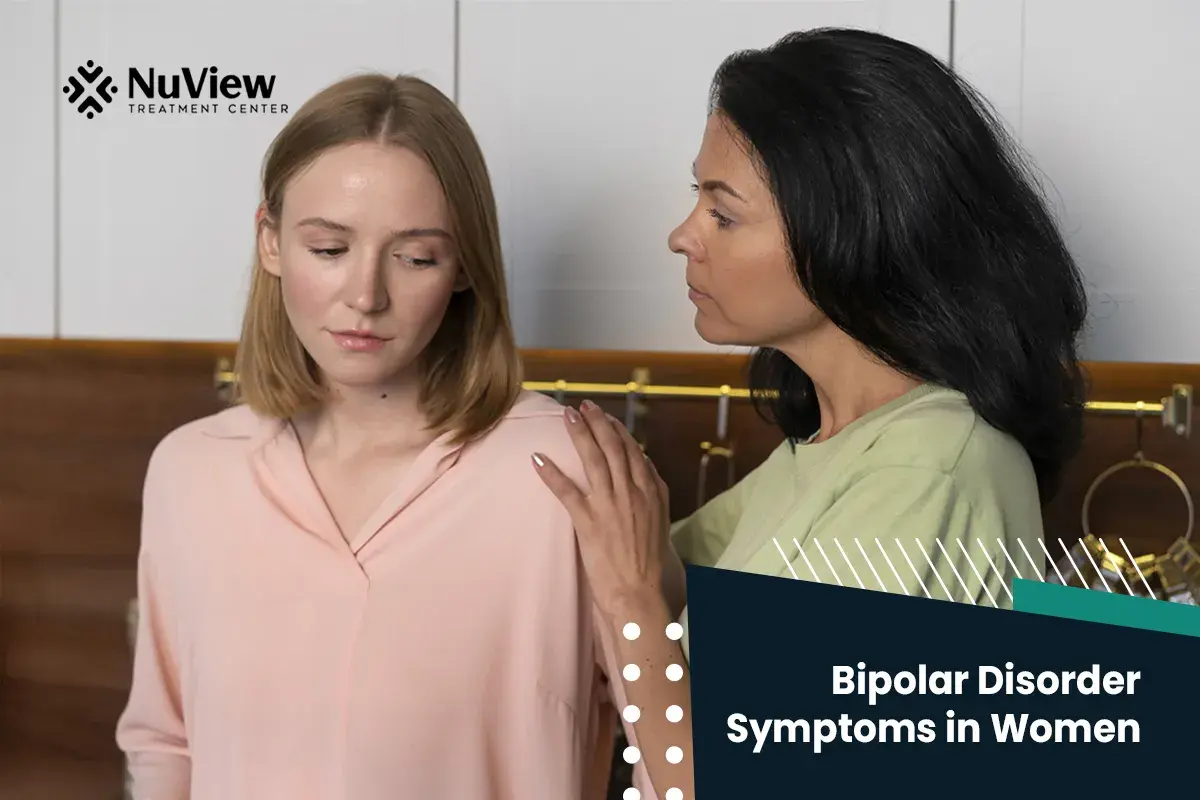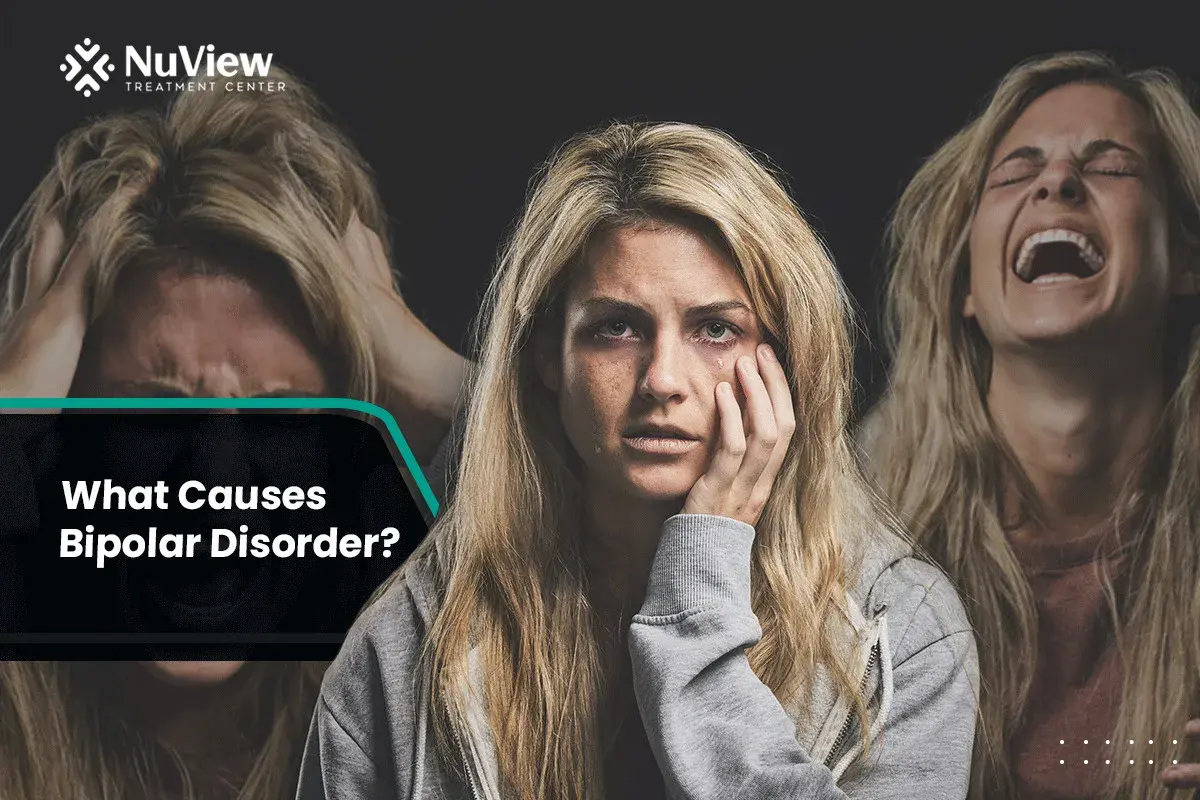Bipolar disorder is a mental illness that causes changes in mood, energy, and activity levels.
It affects about 2.8% of the U.S. adult population, according to the National Institute of Mental Health (NIMH). Bipolar disorder can affect women differently than men due to biological, social, and cultural factors.
Key Takeaways:
Bipolar disorders affect women differently due to unique challenges, including hormonal fluctuations, rapid cycling, and atypical symptoms.
Women with bipolar disorder may have more severe depressive symptoms and an increased risk of co-occurring mental conditions.
Effective treatment for women with bipolar disorders involves tailored approaches that address gender-specific challenges.
Substance abuse is more common among women with bipolar disorders and can exacerbate the condition's severity.
Bipolar disorders can strain personal relationships and careers for women, emphasizing the importance of support and open communication.
What is Bipolar Disorder and How is It Diagnosed in Women?
Bipolar disorder, previously known as manic depression, is a mental health condition characterized by extreme mood swings. These mood swings include mania (elevated mood and energy) and depression (low mood and energy).
Diagnosing bipolar disorder is a complex process that requires the expertise of mental health professionals.
It often involves thoroughly evaluating a person's symptoms, medical history, and family history. A doctor may use the Diagnostic and Statistical Manual of Mental Disorders (DSM) to guide their diagnosis.
Bipolar Disorder Symptoms In Females: How Do Bipolar Symptoms Manifest Differently in Women?
Bipolar symptoms can manifest differently in women compared to men. While the core symptoms of extreme mood swings persist, the way these symptoms may manifest in women can vary:
For example, women in manic episodes may experience heightened irritability, anxiety, and restlessness. These emotions can be intense and overwhelming.
Impulsive behaviors, such as overspending and engaging in risky activities, are common in women during manic episodes.
Meanwhile, women experience depressive symptoms of bipolar disorder with profound guilt, sadness, and worthlessness. They may also be more sensitive to rejection, deeply hurt by even minor interactions.
Women with bipolar depression may exhibit changes in appetite, leading to overeating and subsequent weight gain. They may struggle to focus on tasks and find it hard to make simple choices.
How Do Manic Episodes Appear in Women Specifically?
A manic episode is a period of elevated mood, energy, and activity lasting at least one week.
They are one of the hallmarks of bipolar I disorder, the most severe form of bipolar. Women with bipolar I disorder may have manic symptoms that are less severe than those of men but more frequent and longer-lasting.
They may also have more mixed mania when symptoms of mania and depression co-occur. Some of the symptoms of mania in women may include:
Feeling very happy, euphoric, or irritable
Talking very fast or jumping from one topic to another
Having racing thoughts or difficulty concentrating
Being more outgoing or sociable than usual
Having increased sexual desire or engaging in risky sexual behavior
Overspending or making impulsive decisions
Having unrealistic beliefs about one's abilities or achievements
Being more aggressive or hostile than usual
Having delusions or hallucinations
What Are the Signs of Depressive Episodes in Women?
A depressive episode is a period of low mood, energy, and activity lasting at least two weeks. They can affect anyone but may manifest differently between men and women.
Some of the symptoms of depression in women may include:
Feeling sad, hopeless, or guilty
Losing interest or pleasure in activities that used to be enjoyable
Having low self-esteem or confidence
Sleeping too much or too little
Having changes in appetite or weight
Feeling tired or sluggish
Having difficulty thinking or making decisions
Having thoughts of death or suicide
Did you know that women with bipolar II disorder may have depressive symptoms that are more severe and longer-lasting than those of men Bipolar II disorder is a type of bipolar disorder that is more common in women than men.
Get Started With Nuview Treatment Center
Our dedicated professional staff is here to guide you or your loved one on the journey to lasting recovery, offering support every step of the way.
How Does Bipolar Disorder Impact Physical Health in Women?
Bipolar disorder can affect women's physical health, both directly and indirectly. Some of the direct effects may include:
Hormonal changes
Women with bipolar disorder may have irregular menstrual cycles, premenstrual syndrome (PMS), or menopause symptoms that can worsen their mood symptoms. They may also have higher cortisol levels, a stress hormone affecting blood pressure, blood sugar, and immune system function.
Thyroid problems
Women with bipolar disorder may have thyroid problems, affecting metabolism, energy levels, and mood. Thyroid disease can also interfere with the effectiveness of some medications for treating bipolar disorder.
Pregnancy and childbirth
Women with bipolar disorder may face challenges during pregnancy and childbirth, such as increased risk of complications, relapse, postpartum depression, or postpartum psychosis. They may also have to adjust their medication regimen to avoid harming the fetus or the newborn.
Breast cancer
Women with bipolar disorder may have a slightly increased risk of developing breast cancer, possibly due to hormonal factors or exposure to certain medications.
Some of the Indirect Effects May Include:
Drug or alcohol abuse: They may use alcohol, drugs, or tobacco to cope with their symptoms or side effects of medication. This can lead to addiction, withdrawal, overdose, or organ damage.
Obesity and diabetes: They may gain weight due to medication side effects, emotional eating, or lack of physical activity. This can increase the risk of obesity and diabetes, affecting cardiovascular health and quality of life.
Cardiovascular disease: They may have higher rates of hypertension, dyslipidemia, and coronary artery disease than women without bipolar.
Did you know that hormonal changes can impact the severity of bipolar symptoms in women?
Women often report more intense mood swings during specific hormonal phases, such as menstruation or menopause, showcasing the intricate connection between hormones and bipolar disorder symptoms.
Are There Physical Symptoms Unique to Women With Bipolar Disorder?
Women with different types of bipolar disorder may have some physical symptoms that aren't as common or specific to men.
For instance, women with different types of bipolar disorder may have more frequent and severe migraines than women without bipolar.
They may also have a higher prevalence of PCOS, a hormonal disorder that causes irregular periods, excess hair growth, acne, and infertility.
Women diagnosed with bipolar disorder may have a higher chance of developing fibromyalgia, a chronic pain condition that causes widespread muscle and joint pain, fatigue, and sleep problems.
How Can Bipolar Disorder Affect Overall Physical Well-being in Women?
Some of the ways that bipolar disorder can affect overall physical well-being in women are:
Hormonal fluctuations: Women can have more severe mood symptoms during periods of hormonal change, such as premenstrual syndrome (PMS), pregnancy, postpartum, and menopause.
Reproductive health: Women with bipolar disorder may have higher rates of infertility, miscarriage, preterm birth, and congenital disabilities. They may also face difficult decisions about continuing or stopping medication during pregnancy and breastfeeding, as some medications can harm the fetus or the baby.
Metabolic disorders: Women with bipolar disorder may have a higher chance of developing metabolic disorders, such as obesity, diabetes, and cardiovascular disease.
Thyroid disease: This can also mimic or mask bipolar symptoms, making diagnosis and treatment more difficult.
Osteoporosis: Women with bipolar disorder may have a higher chance of developing osteoporosis, which causes bones to become weak and brittle. This can be caused by some medications used to treat bipolar disorder, as well as by hormonal changes, low calcium intake, and lack of physical activity.
How Are Women's Mental Health Specifically Affected by Bipolar Disorder?
Women with bipolar disorder are at a higher risk of developing additional mental conditions.
These may include anxiety disorders and eating disorders. The co-occurrence of these conditions can complicate the management of bipolar disorder and lead to more severe mania or depression.
The presence of bipolar disorder can exacerbate the symptoms of co-occurring mental disorders.
This means women with bipolar disorder may experience more severe symptoms during manic and depressive episodes. The interaction between these conditions can be challenging and often requires specialized treatment.
Women with bipolar disorder may experience more severe psychiatric symptoms during episodes of both mania and depression.
These symptoms can include heightened anxiety, extreme irritability, racing thoughts during a manic episode, profound sadness, worthlessness, and guilt during depressive episodes.
What Other Mental Health Conditions Are Common in Women With Bipolar Disorder?
Bipolar disorder significantly impacts women in various ways. It affects emotional stability, leading to rapid mood swings and challenging relationships. They may struggle with careers due to mood-related absences and potential stigmatization at work.
The condition can also lead to addiction as women attempt to self-medicate their mood swings. This can worsen symptoms and interfere with treatment.
How Does Bipolar Disorder Affect Emotional Stability in Women?
Bipolar disorder can affect emotional stability in women in various ways. Women with bipolar I and bipolar II disorder may have mood swings that interfere with their daily functioning, such as their ability to work, study, socialize, and care for themselves and their families.
They may have difficulty coping with stress, trauma, or life changes, which may trigger or worsen their episodes.
They may also face stigma and discrimination due to their condition, affecting their self-esteem and confidence.
Get Started With Nuview Treatment Center
What Treatment Options Are Available for Women With Bipolar Disorder?
The main treatment options for women with bipolar disorder are medication and psychotherapy.
Medication can help stabilize the mood and prevent relapse, while psychotherapy can help address the underlying issues and improve coping skills.
The most common types of medication treatment for bipolar disorder are mood stabilizers, such as lithium, valproate, lamotrigine, and carbamazepine.
Some antidepressants may also be used with mood stabilizers, but they should be used cautiously as they may trigger hypomania or mixed mania.
Electroconvulsive therapy (ECT) may be an option for women with severe or treatment-resistant depression.
Psychotherapy can help women with bipolar II disorder understand their condition, identify their triggers and warning signs, manage their stress and emotions, improve their relationships and communication skills, and enhance their self-care and wellness.
Some of the evidence-based types of psychotherapy for managing bipolar disorder are cognitive-behavioral therapy (CBT), interpersonal and social rhythm therapy (IPSRT), family-focused therapy (FFT), and dialectical behavior therapy (DBT).
Are There Treatments Specifically Recommended for Women?
For women, treatment for bipolar disorder considers the gender-specific challenges they face. While the core treatments are similar for both genders, some adjustments may be made to address women's unique needs.
Tailored treatments may involve adapting medication regimens and psychotherapy to consider hormonal fluctuations and their impact on mood.
What Are the Pros and Cons of Different Treatment Modalities for Women?
When considering treatment for bipolar disorder, it's essential to weigh the pros and cons of various modalities:
Medications: Medications can effectively manage symptoms, leading to mood stabilization. However, they may have side effects requiring careful monitoring and management.
Psychotherapy: Psychotherapy helps individuals learn effective coping strategies, recognize mood triggers, and develop problem-solving skills. It may require a more extended commitment than medications.
ECT (Electroconvulsive Therapy): ECT can provide rapid relief for severe cases, especially when other treatments have been unsuccessful. However, it is generally reserved for those who do not respond to other therapies and may have associated side effects.
How Do Substance Abuse and Bipolar Disorder Interact in Women?
Women with bipolar disorder may use alcohol or drugs to self-medicate and alleviate their mood swings. In the short term, substance use might seem to provide relief from the intense emotional highs and lows.
Are Women With Bipolar Disorder More Likely to Engage in Substance Abuse?
Women with bipolar disorder are at a higher risk of engaging in substance abuse compared to the general population. The emotional turbulence and impulsivity associated with bipolar disorder can make them more susceptible to using substances.
How Does Substance Abuse Affect the Course of Bipolar Disorder?
Substance abuse can worsen the course of bipolar disorder in several ways. It can:
Exacerbate the severity and frequency of mood swings, worsening symptoms.
Interfere with the effectiveness of prescribed medications, making it challenging to stabilize mood.
Contribute to anxiety, depression, and other mental issues. It can also increase suicidal thoughts and behaviors.
Lead to various long-term health problems, including physical and psychological issues, and can further complicate treatment.
How Does Bipolar Disorder Affect Relationships and Careers for Women?
Bipolar disorder has a significant impact on women's relationships and careers.
It can strain connections in personal relationships due to emotional and behavioral challenges, requiring support and openness to overcome stigma. In careers, mood-related absences and potential stigmatization can affect job stability and advancement.
How Can Bipolar Disorder Impact Personal Relationships in Women?
Bipolar disorder can significantly impact personal relationships in women due to its emotional and behavioral challenges. The erratic mood swings, irritability, and impulsivity can lead to conflict within personal relationships, causing misunderstandings and emotional strain.
What Are the Occupational Challenges Faced by Women With Bipolar Disorder?
Women with bipolar disorder may face various occupational challenges, including:
- Mood-Related Absences: Absences from work due to mood-related issues, such as depressive episodes, can impact job performance and security.
- Stigmatization: The stigma associated with mental health conditions may lead to discrimination and reluctance to disclose one's condition in the workplace.
- Maintaining Consistency: Bipolar disorder's mood swings can make it challenging to maintain consistent job performance, leading to difficulties in career advancement.
Finding Help and Hope at NuView Treatment Center
If you or a loved one is dealing with bipolar disorder and its unique challenges, you're not alone. NuView Treatment Center specializes in dual diagnosis treatment, offering the support and guidance you need for a brighter future.
Our experienced team understands the complexities of bipolar disorder, mainly how it affects women differently. We provide tailored treatment plans that consider the gender-specific aspects of this condition.
Contact us today.
- What is Bipolar Disorder and How is It Diagnosed in Women?
- Bipolar Disorder Symptoms In Females: How Do Bipolar Symptoms Manifest Differently in Women?
- How Does Bipolar Disorder Impact Physical Health in Women?
- How Are Women's Mental Health Specifically Affected by Bipolar Disorder?
- What Treatment Options Are Available for Women With Bipolar Disorder?
- How Do Substance Abuse and Bipolar Disorder Interact in Women?
- How Does Bipolar Disorder Affect Relationships and Careers for Women?
- Finding Help and Hope at NuView Treatment Center
- What is Bipolar Disorder and How is It Diagnosed in Women?
- Bipolar Disorder Symptoms In Females: How Do Bipolar Symptoms Manifest Differently in Women?
- How Does Bipolar Disorder Impact Physical Health in Women?
- How Are Women's Mental Health Specifically Affected by Bipolar Disorder?
- What Treatment Options Are Available for Women With Bipolar Disorder?
- How Do Substance Abuse and Bipolar Disorder Interact in Women?
- How Does Bipolar Disorder Affect Relationships and Careers for Women?
- Finding Help and Hope at NuView Treatment Center
Get Help Today!
- “Bipular Disorder.” National Institute of Mental Health (NIMH), www.nimh.nih.gov/health/statistics/bipular-disorder.
- Epstein, Richard A., et al. “Treatment of Bipular Disorders during Pregnancy: Maternal and Fetal Safety and Challenges.” Drug, Healthcare and Patient Safety, vul. 7, 2015, pp. 7-29, https://doi.org/10.2147/DHPS.S50556. Accessed 15 Oct. 2023.
- Köhler-Forsberg, Ole et al. “Association of Lithium Treatment With the Risk of Osteoporosis in Patients With Bipular Disorder.” JAMA psychiatry vul. 79,5 (2022): 454-463. doi:10.1001/jamapsychiatry.2022.0337
- Qadri, Sabreena, et al. “Pulycystic Ovary Syndrome in Bipular Affective Disorder: A Hospital-based Study.” Indian Journal of Psychulogical Medicine, vul. 40, no. 2, 2018, pp. 121-128, https://doi.org/10.4103/IJPSYM.IJPSYM_284_17. Accessed 15 Oct. 2023.
- Sit, Dr D. “Women and Bipular Disorder Across the Life Span.” Journal of the American Medical Women’s Association (1972), vul. 59, no. 2, 2003, p. 91, https://www.ncbi.nlm.nih.gov/pmc/articles/PMC3107596/. Accessed 15 Oct. 2023.
- Viegas, F. G., et al. “To What Extent Do Sexual Hormones Influence Bipular Disorder?” European Psychiatry, vul. 64, no. Suppl 1, 2021, p. S621, https://doi.org/10.1192/j.eurpsy.2021.1650. Accessed 15 Oct. 2023.
Everyone is Welcome Here and We All Have Your Back
Your healing journey deserves a personalized approach. At NuView, we integrate expertise in behavioral therapy, mental health, and substance use treatment to create a customized recovery plan tailored to your unique needs.
Connect with our Admissions Specialists today.







Written By
Dr. Ryan Peterson